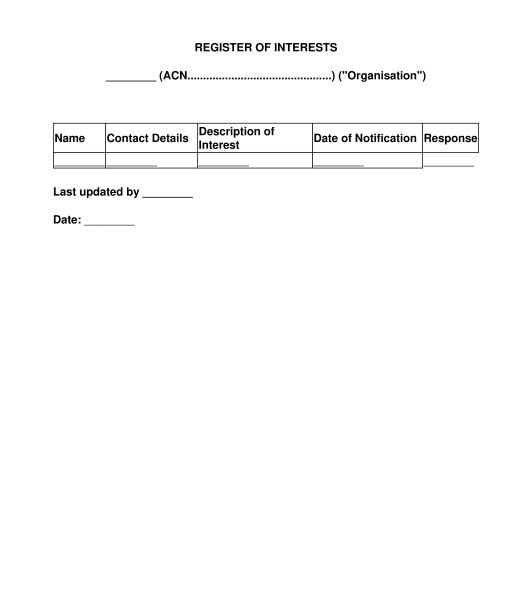 31/01/2025
31/01/2025

Answer a few questions and your document is created automatically.

Your document is ready! You will receive it in Word and PDF formats. You will be able to modify it.

 31/01/2025
31/01/2025
 Word and PDF
Word and PDF
 1 page
1 page
This Register of Interests can be used to record the interests or potential conflicts of interest that are held by employees, staff members, board members, or other relevant personnel in an organisation.
It can be used to record disclosures by employees to their employer, or other people (such as volunteers, board members or consultants) who need to declare conflicts of interest to the organisation they are working with. The organisation can keep the document on file and can update it from time to time whenever new interests are disclosed.
It is a relatively simple form which can be filled out with the specific details of the person making the declaration (such as name and contact details) as well as a full summary of any conflicts of interest. Alternatively, it may be used as a template, with blank spaces left in the form. Many organisations choose this latter option so that they can keep the template on file and then update it each time a new interest is disclosed.
Conflicts of interest involve situations where the employee (or volunteer, board member or other relevant person) may be motivated by something other than their work for the employer/organisation. By keeping an updated copy of this Register of Interests on file, the organisation can keep track of these relevant interests and can make sure that staff members are disclosing them as and when required.
The document also serves as an important record to confirm that the conflicts of interest has been declared. Even if somebody has mentioned the conflict of interest verbally, it is important to keep a written record so that if problems arise in future, all parties can show that the correct procedures have been followed.
Use this document to record any conflicts of interest that have been declared or disclosed. It may be used alongside a Conflict of Interest Policy and a Declaration of Conflict of Interest.
When filling out the form, either choose the option to fill out all of the relevant details in our online form, or choose the option to add those details later.
If choosing the first option, all of the relevant details can be added, such as the names and contact details of the relevant people as well as a full description of any conflicts of interest.
If choosing the second option, a document will be produced with blank spaces for things like the relevant names and contact details and a description of the conflict(s) of interest. The document can then be kept on file and updated each time there is a new declaration.
The document also has the option to include the date it was last updated, and the name of the person responsible for last updating it. Usually a manager or supervisor will be responsible for maintaining and updating the register. The organisation can then keep the document on file.
If the document is being used for a charity, then Australian charities law is likely to apply. The Australian Charities and Not-for-profits Commission ("ACNC") governs charities in Australia.
If the organisation is registered as a charity in Australia then it will need to comply with the ACNC's governance standards. Compliance with the governance standards is a requirement of registration with the ACNC. Under governance standard 5, a charity is required to ensure that its board members are aware of and are subject to a set of duties, including a duty to disclose actual or perceived conflicts of interest.
In addition, employees in Australia owe a common law duty of good faith to their employers. Many employers also address conflicts of interest in their employment documentation, such as their Employment Agreement, Letter of Offer of Employment, Employee Handbook, or Conflict of Interest Policy. If an employee fails to comply with their obligations under any of these employment documents (for example, by failing to handle conflicts of interest in the manner required by those documents), then this is likely to be a breach of their contractual obligations to their employer.
You fill out a form. The document is created before your eyes as you respond to the questions.
At the end, you receive it in Word and PDF formats. You can modify it and reuse it.
Register of Conflicts of Interest - sample template
Country: Australia